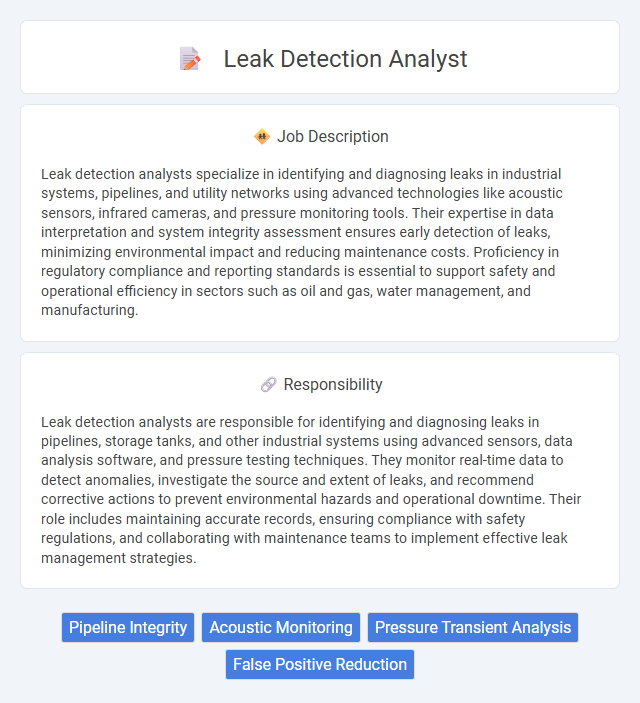
Leak detection analysts specialize in identifying and diagnosing leaks in industrial systems, pipelines, and utility networks using advanced technologies like acoustic sensors, infrared cameras, and pressure monitoring tools. Their expertise in data interpretation and system integrity assessment ensures early detection of leaks, minimizing environmental impact and reducing maintenance costs. Proficiency in regulatory compliance and reporting standards is essential to support safety and operational efficiency in sectors such as oil and gas, water management, and manufacturing.
Individuals with strong attention to detail and analytical skills are likely to excel as leak detection analysts, as the role often involves identifying subtle signs of system malfunctions. Candidates who enjoy working with data and technology, while maintaining patience during methodical testing processes, may find this job suitable for their abilities. Those who prefer dynamic, fast-paced environments might find the repetitive and investigative nature of leak detection less engaging.
Qualification
A Leak Detection Analyst typically requires a strong background in petroleum engineering, environmental science, or a related field, combined with expertise in pipeline inspection technologies and data analysis. Proficiency in using ultrasonic, acoustic, and pressure monitoring tools to identify and assess leak risks is essential. Strong analytical skills, attention to detail, and knowledge of regulatory compliance standards like API 1169 and EPA guidelines improve job performance.
Responsibility
Leak detection analysts are responsible for identifying and diagnosing leaks in pipelines, storage tanks, and other industrial systems using advanced sensors, data analysis software, and pressure testing techniques. They monitor real-time data to detect anomalies, investigate the source and extent of leaks, and recommend corrective actions to prevent environmental hazards and operational downtime. Their role includes maintaining accurate records, ensuring compliance with safety regulations, and collaborating with maintenance teams to implement effective leak management strategies.
Benefit
Leak detection analysts probably experience improved operational efficiency by identifying and addressing leaks early, leading to cost savings and reduced downtime. Their work likely enhances environmental protection, minimizing the risk of hazardous material spills and regulatory fines. Opportunities for career growth and skill development in advanced diagnostic technologies may also be significant benefits in this role.
Challenge
Leak detection analyst roles likely involve complex problem-solving challenges due to the need for accurately identifying hidden leaks within intricate systems. The job may require analyzing vast amounts of data from various sensors and employing advanced software, which can present continuous technical and analytical difficulties. Handling false positives and minimizing detection errors could also pose significant challenges in maintaining system integrity and operational efficiency.
Career Advancement
Leak detection analysts leverage advanced technologies such as acoustic sensors and infrared imaging to identify and analyze pipeline leaks, enhancing operational safety and efficiency. Mastery of data interpretation and report generation paves the way for roles in pipeline integrity management or environmental compliance. Career advancement often leads to senior analyst positions or supervisory roles within utility companies, energy sectors, or environmental agencies.
Key Terms
Pipeline Integrity
Leak detection analysts specializing in pipeline integrity utilize advanced monitoring technologies and data analytics to identify potential leaks in oil and gas pipelines, ensuring operational safety and environmental compliance. They analyze sensor data, pressure trends, and flow rates to detect anomalies indicative of pipeline breaches or weaknesses. Expertise in pipeline integrity management systems and regulatory standards is critical for preventing environmental hazards and maintaining asset reliability.
Acoustic Monitoring
A Leak Detection Analyst specializing in Acoustic Monitoring uses advanced sound detection technology to identify and locate pipeline leaks with high precision. They analyze acoustic signals captured by sensors and employ signal processing algorithms to distinguish leak noise from background disturbances. Expertise in interpreting acoustic data ensures early leak detection, minimizing environmental impact and operational downtime.
Pressure Transient Analysis
A Leak Detection Analyst specializing in Pressure Transient Analysis utilizes advanced pressure data monitoring and interpretation techniques to identify and quantify leaks in pipelines and reservoirs. By analyzing pressure wave patterns and transient pressure changes, the analyst detects anomalies indicative of leaks, ensuring timely intervention and minimizing environmental impact. Expertise in reservoir engineering software and fluid dynamics principles enhances the accuracy and reliability of leak detection processes.
False Positive Reduction
Leak detection analysts utilize advanced data analytics and machine learning algorithms to minimize false positive rates in leak detection systems. They refine sensor calibration, optimize signal processing techniques, and apply statistical models to differentiate true leaks from noise or benign anomalies. These efforts enhance the accuracy and reliability of leak detection, reducing unnecessary maintenance costs and improving safety protocols.
 kuljobs.com
kuljobs.com